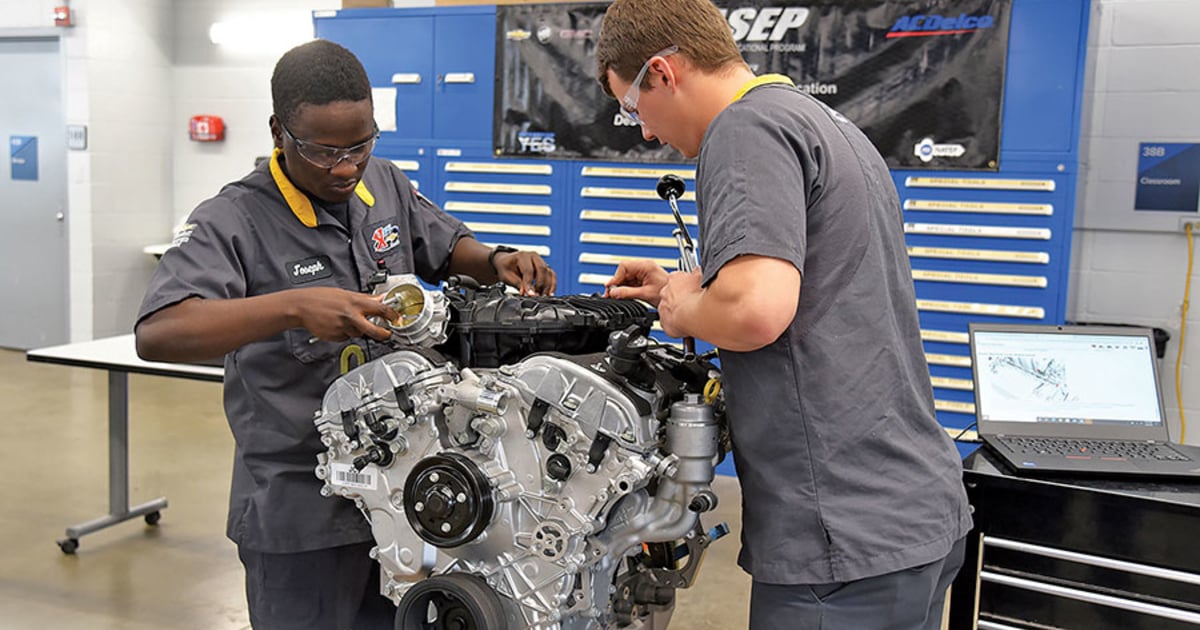
With dealership service technicians in short supply, General Motors says it’s seeing some improvement toward building a talent pipeline.
Enrollment in GM’s Automotive Service Educational Program, which trains aspiring technicians through a partnership mostly with community colleges across the U.S., is at a 10-year high, said Eric Kenar, GM’s manager of technician environment and service technical training.
Enrollment in the program this year tops 600 student technicians, Kenar said. Since 2012, enrollment has totaled between 365 and 450 students per year.
One reason for the bump, Kenar said, may be the impact of a two-year-old marketing campaign, “Bring Us Your Talent,” that aims to change the image of auto repair as a career. Kenar, along with dealership service technicians themselves, say the job requires more electrical and technological knowledge than it once did.
“It’s a very, I would say, mentally intensive as well as [labor]-intensive career,” said Jonathan Cote, lead technician at Ed Rinke Chevrolet-Buick-GMC in suburban Detroit, who started at the dealership 10 years ago as a student of the program. “It’s not just all labor. It’s a lot of critical thinking that goes into it, outside of the physical taking things apart and putting them back together.”
To date, the marketing campaign has recorded about 840,000 visits to a related website. Of those, 17 percent have turned into an action, such as inquiring with a college.
Kenar said the campaign is a step up from past efforts, offering testimonials from technicians and detailed information about career paths, education costs and requirements, and salary.
“We’re trying to target parents, teachers, influencers of the younger students to really change the view around being a technician itself,” he said. “It’s a very lucrative career.”
And one that is under pressure. Some estimates peg the shortfall of automotive service technicians in the hundreds of thousands over the next decade as the bench of younger talent isn’t large enough to offset the numbers of retiring older technicians. And, Kenar said, a push to get high school students to pursue four-year college degrees has steered some potential technician candidates away from the field.
“In the last 10 years, our enrollment had really dropped because of that,” he said.
The Automotive Service Educational Program began in 1979 and has produced more than 17,000 technicians to date. GM donates vehicles and technology to partnering schools. It emphasizes training on internal combustion vehicles, though it does include some electric vehicle awareness and safety training, he said. More training for EVs will follow as volumes increase.
The two-year program is run in eight-week segments, including classroom and hands-on instruction at a college and a paid role working at a dealership that agrees to sponsor the student. Kenar said the placement rate of students who land full-time jobs with their dealership sponsors is in the high-90 percent range.
“We have dealers that sponsor students year after year after year because they want to keep building that pipeline,” he said.
Ed Rinke Chevrolet-Buick-GMC brings in two Automotive Service Educational Program students each year, said Tyler Wegner, a service manager at the dealership in Center Line, Mich. The dealership currently has a second-year student working there, while another will begin the program in August.
Wegner is a graduate of the program, having started at the dealership changing oil. He was promoted to service manager after completing his bachelor’s degree in automotive management.
The dealership is short on technicians, he said, particularly for specialty work on heavy-vehicle engines and transmissions.
Cote said the technician program “was definitely the pathway that opened up the opportunities that I’ve had.”
He has expanded his skills through additional GM training, including becoming a GM world-class certified technician and certified to work on EVs. The program has helped him discover multiple long-term career opportunities in automotive service.
Cote said he thinks he would be “years and years behind” in his career if he had not learned the fundamentals of vehicle systems through GM’s Automotive Service Educational Program.
“It really helps advance how far you can go quicker,” he said. “It was a great foundation to then continue to work off of, and gave me a really great career path.”